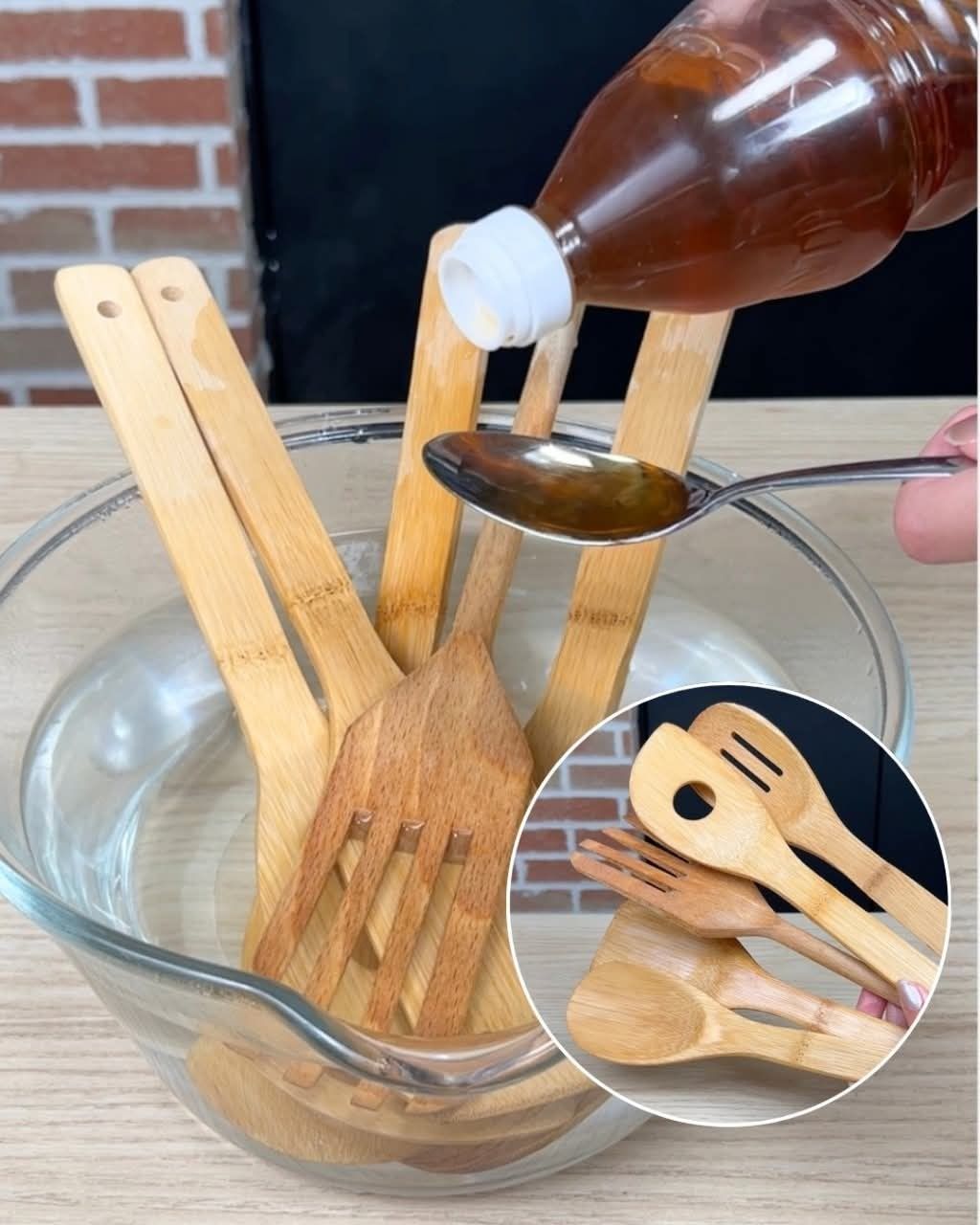ADVERTISEMENT
For Complete Cooking STEPS Please Head On Over To Next Page Or Open button (>) and don’t forget to SHARE with your Facebook friends
1. Basic Cleaning: Wash Immediately After Use
The best way to care for your wooden spoons and utensils is to clean them right after using them. Leaving food residue to sit for too long can cause staining and odors that can be harder to remove later.
How to do it:
- Rinse under warm water: After each use, rinse the wooden utensil with warm water immediately. Avoid soaking it in water, as prolonged exposure can cause the wood to warp or crack.
- Use mild soap: Clean the spoon or utensil with gentle dish soap using a soft sponge or cloth. Harsh detergents can strip the wood of its natural oils, leaving it dry and brittle.
- Scrub gently: Always scrub gently to avoid damaging the surface of the wood. Focus on any areas where food may have gotten stuck or left residue.
Pro Tip: After rinsing, dry the wooden utensil immediately with a clean towel to prevent moisture from seeping into the wood.
2. Dealing with Stains and Odors: Restore the Wood’s Freshness
Wooden spoons and utensils are great at absorbing flavors, but they also tend to retain stains and odors, especially after using them for garlic, onions, or tomato-based dishes. To eliminate these lingering scents and stains, follow these easy tricks:
How to do it:
- Baking soda paste: For stubborn stains or odors, mix baking soda with water to create a paste. Apply the paste to the stained area and let it sit for about 5-10 minutes. Then, scrub gently with a soft cloth or sponge. Baking soda works as a mild abrasive and deodorizer, helping to lift stains and neutralize odors.
- Lemon and salt scrub: For an all-natural solution, sprinkle coarse salt on the surface of the wooden utensil and rub it with a half lemon. The acidity of lemon helps to cut through grease and stains, while the salt acts as a scrubber to lift dirt and odors. This is also a great method for maintaining the natural shine of the wood.
- Vinegar and water: Mix equal parts of white vinegar and water in a bowl and dip a clean cloth into the solution. Wipe down the utensil with this mixture to help remove odors and stains. Make sure to rinse thoroughly afterward with warm water.
Pro Tip: Always dry wooden utensils completely after using vinegar or lemon, as excess moisture can damage the wood over time.
3. Conditioning and Sealing: Keep Your Wooden Utensils Looking New
Over time, wooden utensils can lose their natural oils, which may cause them to dry out, crack, or look dull. Conditioning the wood regularly with the right oils can restore its luster, help prevent cracking, and keep the utensils smooth and supple.
How to do it:
- Use mineral oil or beeswax: Regularly treat your wooden spoons and utensils with food-safe mineral oil or beeswax to keep the wood conditioned and sealed. These oils penetrate the wood, replenishing its natural moisture and preventing cracking. Apply a small amount of oil to a soft cloth and rub it onto the utensil, ensuring that it’s fully absorbed. Let the utensil sit for a few hours or overnight before wiping away any excess oil.
- Coconut oil (optional): If you prefer an all-natural option, coconut oil works well for conditioning wooden utensils. Apply it in the same way as mineral oil, but be cautious with coconut oil as it can solidify at cooler temperatures.
- Beeswax polish (optional): For a more natural approach, you can use a beeswax-based polish to create a shiny, protective layer. It will seal the wood, preventing moisture from being absorbed, and can even enhance the wood’s natural color.
Pro Tip: Condition your wooden spoons every 1-2 months or whenever they begin to look dry or faded. Avoid using vegetable oil, as it can turn rancid and affect the wood.
Bonus Tips for Maintaining Wooden Utensils
- Don’t soak: Always avoid soaking wooden spoons and utensils in water for long periods of time, as the wood can absorb moisture and crack or warp.
- Avoid the dishwasher: Never place your wooden utensils in the dishwasher, as the high heat and harsh detergents can damage the wood and strip away its natural oils.
- Store properly: Store wooden spoons and utensils in a dry, cool place. Avoid leaving them in direct sunlight for long periods, as this can cause the wood to dry out and fade.
Conclusion
Caring for your wooden spoons and utensils doesn’t have to be a hassle—it just requires a little attention to detail. By following these three must-do cleaning and conditioning tricks, you’ll keep your wooden kitchen tools looking beautiful, smelling fresh, and in perfect working order. Regular cleaning, removing stains and odors, and conditioning the wood will ensure that your spoons and spatulas last for years to come.
With these simple steps, you can continue to enjoy the timeless beauty and functionality of your wooden utensils while keeping them in top-notch condition. So go ahead, give your wooden kitchen tools the care they deserve!
